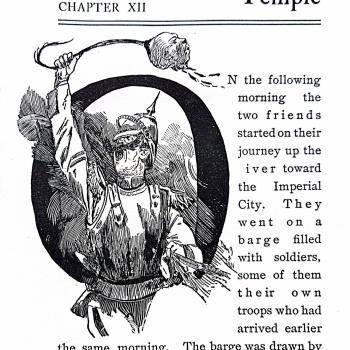Lectionary Reflections
Psalm 29
January 11, 2015
Clearly, the name of this Sunday, "The Baptism of the Lord," arises from its New Testament text, Mark 1:4-11, where that 1st-century hippie, John the baptizer — dressed in his smelly camel hair shirt, with locust parts stuck in his unkempt beard — baptizes Jesus in the River Jordan. The audience that day, according to Mark, includes "all the people of Jerusalem" along with "people from the whole Judean countryside" (Mark 1:5). The wild John was apparently the best show around with his talk of water baptism to be followed with an altogether different sort of baptism, this time with the Holy Spirit, authored by Messiah himself. Luke adds a very nasty tone to John's preaching, claiming he calls those who have come to see the show "broods of vipers" and other choice epithets. Such foul language would make me ask for the price of my ticket returned!
But right after the announcement of Holy Spirit baptism, Jesus shows up, and Mark makes it clear for his readers that it is Jesus who is Messiah by saying, "A voice came from heaven, 'You are my son, the Beloved; with you I am well pleased" (Mark 1:11). Later in Mark's gospel this same voice will announce, this time rather more sharply, on a mountain, "This is my son, the Beloved; listen to him!" (Mark 9:7). We all should pay attention when the voice of God is in its thundering mode. Well, duh!
The problem is, of course, that the thundering voice is seemingly quite muted in our day. Well, that is not quite correct I suppose; the voice of God seems quite loud at times, according to any number of religious folk who claim to hear that voice on a regular basis, quite clearly telling them precisely what to do and believe. "Hate the gays," they claim the voice says. "Execute all sinners," shouts the voice. "Decapitate the infidel," howls the voice. It is enough to make one wish to be deaf to such a voice. How did it come to this, that the voice of God became so angry, so vindictive, so furious as to demand that we hate and kill one another as a kind of divine duty, the proper response to a divine demand?
It was not always so. The voice of YHWH was not always connected with human retribution and murder and hate. There was a time, a very long time ago in fact, when the voice of YHWH was celebrated for its power to bring strength and peace, rather than the power to incite war and hatred. Let's go back to Psalm 29 to witness another way to imagine the voice of YHWH.
In Psalm 29 we are gazing at a very old piece of poetry, nothing less than the single oldest piece of literature in the entire Bible, if scholars be correct, and I think they are. This particular psalm has been discovered among the poetry of the Canaanites, included in a huge cache of tablets found at the very ancient site of Ras Shamra on the coast of contemporary Lebanon. A French expedition in the third decade of the last century unearthed the tablets, written in cuneiform characters, but without doubt revealing to us much about the culture and thought of those people who lived in the land before and during the time of the Israelites whom they called Canaanites. We read in the tablets of the high god El, the storm God Baal and his consort Astarte, and their many adventures in the pantheon of divinities: the creation of the world, the great flood, how the many gods interact with their human creations. In short, these texts are nothing less than the precursors of much of Hebrew thought and practice. Oh, the Hebrews rejected much of what they knew of their neighbors, but they borrowed much from them as well.
And among the borrowings were the words of what became Psalm 29. At Ras Shamra we read "Ascribe to Baal, you heavenly beings, ascribe to Baal glory and strength, ascribe to Baal the glory of his name; worship Baal in holy splendor!" You may easily see that Psalm 29 is in fact a Canaanite psalm, whose ideas slide easily into Hebrew thought and practice. All the Hebrew poets did was to substitute the name of their God, YHWH, for the Canaanite Baal, and they felt that they could sing this song.
What attracted the Hebrews to the Canaanite poem is the way it understood the voice of God and its active power. "The voice of YHWH is upon the waters," a phrase that recalled for them several places in their sacred history: the creation of the world by the sound of YHWH's voice in Genesis 1; the control of the waters at the Sea of Reeds during the miracle that made the escapees from Egypt the people of YHWH in Exodus 14; the mastery of the waters of the Jordan that brought Israel from wilderness into the land of promise in Joshua 3. Later the prophet we know as II-Isaiah rang his changes on this talk of water power when he supported the fading exiles in Babylon with these unforgettable words: "When you pass through the waters, I will be with you, and through the rivers, they shall not overcome you" (Is. 43:2) Little wonder that this very ancient poem hymns the power of YHWH over the waters.





